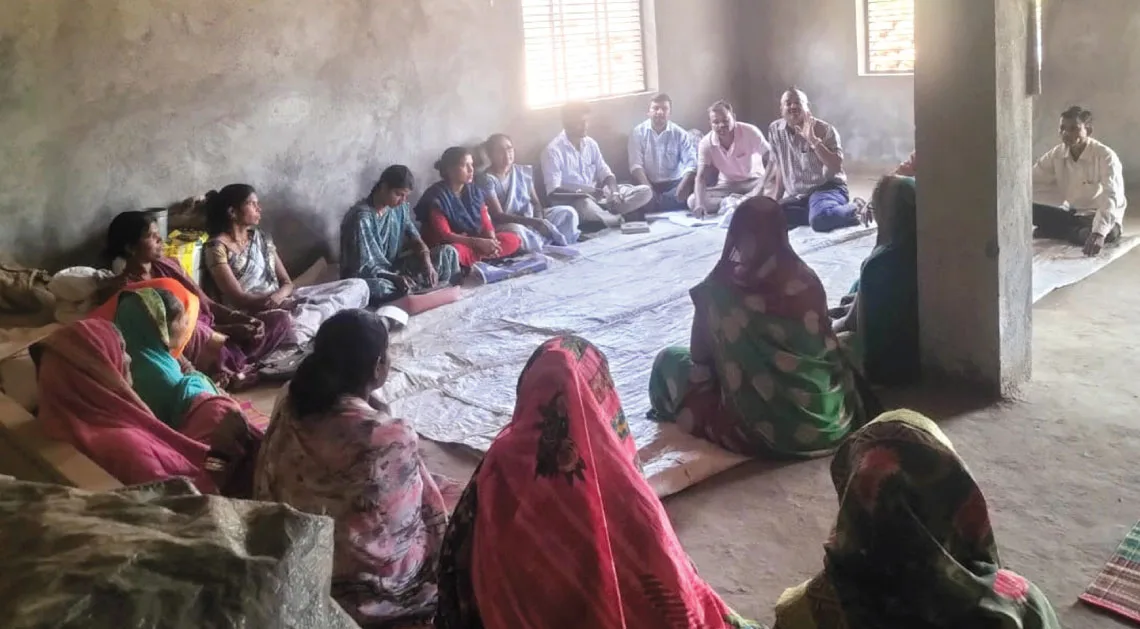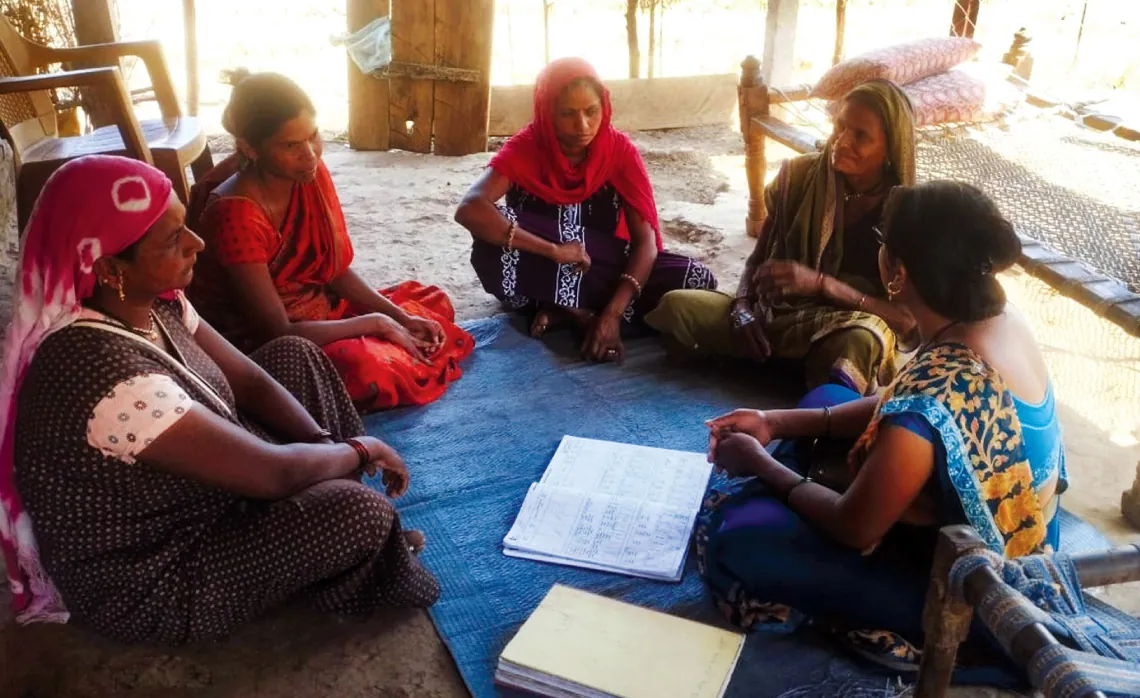Out with the old
With divinity on their side, 3,325 women farmers in Maharashtra’s Nandurbar district are forging a bright new future in farming
The Pawra and Bhil tribes of Nandurbar district in Maharashtra worship Yahamogi as their goddess of food and protection. It was only fitting, then, that when they formed a farmer producer company (FPC) in 2018, they would name it after their revered deity. Especially since this is an all-women organisation.
The Yahamogi FPC is a registered entity with its head office in Mundalwad village in tribal-dominated Nandurbar. Over the years, it has emerged as an institutional model for grassroots-driven, women-led agri-businesses that work to uplift small and marginal farmers through sustainable agricultural practices, better and enduring market access, and technological inputs.
Yahamogi was set up with help from Collectives for Integrated Livelihood Initiatives (CInI), a partner organisation of the Tata Trusts. It is an apex body that represents 76 village institutions in 81 villages in Dhadgaon and Akkalkuwa in Nandurbar. The FPC, with a shareholder base of 3,325 members, is governed by a five-member board of directors headed by a managing director, three of whom are women.
A journey blessed
- Named after a tribal deity, the Yahamogi FPC comprises 3,325 women members
- The FPC represents 76 village institutions in 81 villages in Maharashtra’s Nandurbar district and is governed by a five-member board of directors
- Yahamogi’s core strengths are supplying agricultural inputs, helping with marketing, and providing technical and farm mechanisation services
To understand how Yahamogi became such a successful livelihood initiative, we need to go back a few years. “In 2014, when we started working in Dhadgaon, 99% of the farmers there were in traditional agriculture,” says Vijaysing Patil, area manager at CInI. “They grew maize and millets, which are staples and intended only for home consumption. There was very little surplus, and if so, it was sold at the local market. The farmers did not even think of growing vegetables, which are cash crops, except in their kitchen gardens.”
Having grown the staples for generations, the farmers were reluctant to try anything new. They rejected hybrid seeds, unsure of their productivity, and were wary of rotating crops. During the sowing season, they would broadcast the seeds in straight lines in channels, as they had always done. This was a backbreaking, labour-intensive process. All of this was about to change.
“We did not have the right knowledge about agriculture and were blindly following what our families had done for decades,” says Madhuri Valvi, the 40-year-old managing director of Yahamogi FPC. “Earlier, when we grew maize and radish, we found it difficult to protect them from pests and usually ended up with just enough for the family. We had no access to quality seeds or fertilisers and no idea about seed treatment.”
Unfair deal
Worse still, they had to buy farm inputs at a premium from traders who visited the village, and these middlemen also became their conduit to the market. Getting a fair price for their produce was out of the question. When seeds were not available in the village, farmers would have to travel 75km to Nandurbar market to purchase them.
Now, thanks to CInI, Ms Valvi and most of Yahamogi’s other women farmer-shareholders get quality seeds, fertilisers and farm implements practically at their doorstep. That usually is a designated spot in the village, which also serves as a collection centre for their produce.
There’s more in the CInI mix. Ms Valvi has adopted rotational farming in her 5-acre plot, growing tomato, brinjal, cabbage, cauliflower, cow pea and, in the summer, watermelon and groundnut. But the star of the crops in this area is green chilli, to which Ms Valvi devotes a full acre of her farm and grows throughout the year because it sells well.
“The change in mindset, from traditional subsistence farming to commercial cultivation, has come after years of demonstrations,” says Mr Patil. “While village institutions and the local self-help groups have played a big role in this, it was also up to us to find ‘innovators’ among the small-scale farmers, people willing to experiment with hybrid seeds and new practices.”
Once CInI identified its innovators, they became forerunners in converting their fellow villagers. For instance, these innovators were initially persuaded to plant 100-200 saplings of certain vegetables and use well-treated hybrid seeds. Once there was a good crop that sold well, others decided to join in.
Trying new methods and better seeds has taken Ms Valvi’s agricultural income from ₹30,000-35,000 a year to about ₹200,000. She’s constantly trying out new seed varieties, the kind that yield thicker-skinned tomatoes that don’t get squashed, smaller brinjals, spicier chillies and Nandurbar’s famous purple garlic.
Yahamogi’s business activities focus on three core areas. First, supplying quality agricultural inputs such as seeds, fertilisers and pesticides. Second, output marketing, especially for vegetables, involves finding new and more lucrative places to sell produce. Third, to provide on-field technical and farm mechanisation services.
The FPC has enabled its farmer-members to access markets within the district and beyond — even up to Surat in neighbouring Gujarat — through three collection centres. This directly benefits more than 1,200 farmers. The plan is to expand the network to cover more geographies and commodities.
Continuously evolving as a full-service agriculture solutions provider, Yahamogi’s technical and farm mechanisation services operate under six custom hiring centres — managed by user groups of 10–12 farmers — that are equipped with tractors and different implements.
The FPC has established strategic dealerships with 17 agri-input and technology companies. These partnerships facilitate the supply of various kinds of micro-irrigation systems, mulch film, spray pumps and other farm machinery at affordable prices, along with technical support and training.
For Kusum Rahase, a member of Yahamogi’s board, farming was never the main source of household income. Her husband, Sunil, was a temporary teacher at the local primary school. The family owned a 3.5-acre plot in Manvani village in Nandurbar, where they cultivated small amounts of maize and sorghum.
Sunil’s unexpected death in 2015 changed everything for Ms Rahase. She realised she needed a substantial income source to support her family of three, and quickly. She put her kids in an ashram school, tried working as a midday meal attendant and took hefty loans. Then, at a village meeting, she heard how small-scale farmers like her had made it big.
Ms Rahase embraced farming like the lifeline it would soon become. “I got out of traditional methods of cultivation and started rotating crops for all-year-round output,” she says. She bought high-yield varieties of seeds and saplings, even dug a well for better access to water. “I now have at least two seasons of various crops, sometimes three.”

Improvement curve
Ms Rahase’s crop of green chillies, garlic, onion and cabbage brings in ₹70,000-80,000 a year, and she knows she can do better. “I want to keep improving; that’s why I still attend as many training sessions as I can.”
Ms Rahase has become a valuable asset for Yahamogi. As the cluster head for 10 villages, she holds regular meetings to update other women farmers about the latest agritech and inputs. Her grassroots-level dissemination of information, reassuring manner and her own success story have brought many more women into the company fold.
“Earlier, I didn’t dare to speak up even in my own family,” says Ms Rahase. “Now, becoming an FPC office bearer and successful farmer has given me so much confidence that I can talk freely at any gathering, no matter how large. I even visit government offices and speak my mind about what our FPC needs. And, usually, people do listen.”
It’s not just Ms Valvi and Ms Rahase. Many of Yahamogi’s women farmers have been leading from the front, says Dinesh Pardeshi, an assistant manager with CInI and the FPC’s chief executive. “They know what they want and are not afraid to try and get it,” he says. “Whether it is improved farming practices, enrolling new members or finding new markets, the FPC members bring new thoughts to the table and take all the initiative themselves.”
